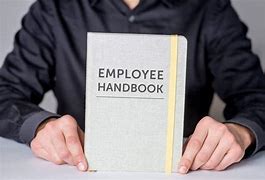Below is a review of the posts (on Facebook, LinkedIn, and Twitter) from the past week. You can check out the full posts by clicking on the links.

In the post on Sunday 10/9/2022 we were reminded that it is time to update your employee handbook. And no, that was not a question. Why? Because whether it is your operations or processes or the law, something has changed, meaning the handbook must be updated. Just a few of the things to review and update are whether there is an express prohibition of discrimination on the basis of sexual orientation and gender (for the reason noted in the post), if light-duty assignments are available for employees who suffer a workplace injury (and if so, what that means by way of other accommodations), if employees are paid for some but not all short-term absences (and how that might violate federal law), and 7 other things listed and detailed in the post. Sometimes having a handbook that is not legally compliant can be worse than not having one at all – see the post for the reasoning.
TAKEAWAY: Make sure to update your handbook – or put one in place – and that it is legally compliant.

The post on Monday 10/10/2022 told us a disabled veteran has waited eight years for a $1M settlement from the US Air Force. David Bighia joined the Army Reserves while in college. After a few years he trans-ferred to the Air Force to follow his father’s path. He then rejoined the Army. After 16 total years of military service, he took an honorable discharge. He then started working as an army historian (as a civilian). In 2013 Bighia applied for a job as a military historian at an Air Force base (which would have been a promotion for him). The Air Force extended a job offer contingent on the things noted in the post. Bighia was confident after his pre-employ-ment health assessment. He had no idea what would come. Eight years later he is fighting the Air Force in an employment discrimination case (the status of which is in the post). So what happened? The Air force rescinded its job offer a few days after the physical (why is in the post). Documents in the case contradict the given reason for recission of the job offer. The EEOC determined that the Ari Force’s actions violated the Rehabilitation Act of 1973. The case had been pending so long because what the Air Force will pay Bighia is at issue. What the Air Force appealed as part of the case is noted in the post. This has all had a huge financial impact on Bighia and his family – he even had to file for bankruptcy to stop a home foreclosure. Bighia was supposed to get payment from the Air Force earlier this summer, months before a scheduled foreclosure. He did not receive the funds. But what happened (good this time) is in the post. Bighia has applied for over 200 jobs while waiting for this to be resolved, but none panned out. As to some, he was interviewed but not hired (the basis for the non-hire is in the post). Ironically, after all of the media attention his case garnered, the Air Force offered Bighia a job in early September. But he might not qualify – yep, see the post as to why.
TAKEAWAY: Judgment is one thing, collection is another; contact a lawyer for assistance with both.

The post on Tuesday 10/11/2022 told us the EEOC sues Lakeside Plastics for racial harassment and retaliation. Lakeside manufactures traffic safety products and more. The EEOC alleged that it violated Title VII by subjecting a Black employee to a hostile work environment because of his race and then firing him in retaliation for complaining about the harassment. The EEOC filed suit September 29, 2022 after conciliation failed. The suit alleges that the employee worked for Lakeside from June to July 2019 (nope, not a typo) and was harassed by a white employee who did and said the things noted in the post. The Black employee complained to his supervisors and then was fired. What the EEOC seeks by way of redress is noted in the post.
TAKEAWAY: All employees are entitled to a color-blind workplace – train your employees to help you avoid becoming a defendant in your own lawsuit.

The post on Wednesday 10/12/2022 was about a man in dispute with HOA over artificial turf in front yard. Brian Epperson has lived in his Utah home since November 2021. Earlier in 202 he decided to install artificial turf in his front yard to save water (laudable, right?). He knew that his HOA had previously prohibited such action, but thought he was protected by a new law (what the law does is in the post). Despite that, the HOA still tries to require or prohibit certain landscaping things. Why Epperson says their restrictions are faulty (and contradictory to the law) is in the post. He says that if he follows the HOA restrictions he would be using over 200,000 (not a typo) gallons of water a year, whereas what he installed will take less than 40,000 gallons a year. The HOA did not respond to requests for comment and Epperson is not paying the fines the HOA is assessing. He says he’s willing to go to litigation fi need be.
TAKEAWAY: Homeowner and condo associations may impose restrictions on residents but those restrictions must comply with all applicable laws. Contact a community association lawyer as to your rights and obligations.

In the post on Thursday 10/13/2022 we read that a man arrested for claiming to be HOA President apologizes. Crazy, right?!? Neil Carson went to the City Council meeting on August 9, 2022, held in City Hall. The City Manager, Mayor, and other officials noted in the post were all in attendance along with other interested persons. At one point in the meeting items were presented and people are allowed to comment and testify. The Council meetings are considered quasi-judicial (and how that is conveyed to attendees and the procedure followed is noted in the post). The Council meetings are recorded and uploaded to the municipal YouTube channel. At this meeting one agenda item concerned a resolution to approve a master develop-ment plan and grant related waiver requests. The subject of all of that is an 8-story building that has a small commercial space and 271 residential units with amenities. During that agenda item, someone who identified as “Neil Carson” went to the podium and said he was the President of the “Andover HOA”. Details on that HOA are in the post. But there’s a problem: Carson is not, nor was he ever, the association’s president. The HOA’s law firm sent a letter to the Mayor as to that fact (and that Carson is not even on the Board). On September 18, 2022 the police contacted Carson and arrested him. What he told the arresting officer is detailed in the post (including the reason he did what he did). Now Carson is out on bail and awaiting trial.
TAKEAWAY: Don’t lie, especially about something that is easily checked – and that could have repercussions for others.

The post on Friday 10/14/2022 was about what manufacturing and other employers can expect from the NLRB. And the Board’s General Counsel has set enforcement priorities. Potential changes include card check (referencing a violation of the Act when an employer does not, without a legitimate reason, accept majority support for a union based on signed authorization cards), quickie strikes (where employees intermittently walk off for short periods that do not allow for the employer to hie replacements – more of an explanation is in the post) and 2 more items described in the post.
TAKEAWAY: You may ask why you care about any of this. Well, you care because certain provisions of the NLRA (National Labor Relations Act) apply to ALL employees, regardless of union status of the workplace.

Finally, in the post yesterday 10/15/2022, we read about Labor Law: Paying employees and planning for disasters. Given many natural disasters, with the latest being Hurricane Ian, this doesn’t seem too far from reality, right? And it includes even snowstorms and the unexpected pandemic so employers must know the legal implications relative to paying employees when they cannot work due to the disasters. Federal law does not require non-exempt (hourly) employees to be paid if they did not work, even if they were sent home or cannot work because of bad weather. But what if the employee is exempt from overtime? It depends. How that plays out is explained in the post. And yes, remote work can come into the equation too.
TAKEAWAY: Consult an employment lawyer to determine when you have to pay employees in certain situations.

 York, Pennsylvania 17403
York, Pennsylvania 17403